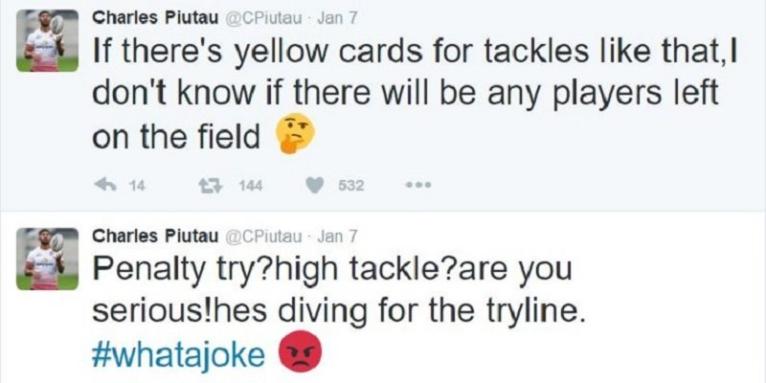Rugby just introduced new tackle ball laws, and everyone’s arguing about whether they’re good or bad. Hayden Donnell settles the debate with a binding legal judgement.
One of the greatest things about rugby is being allowed to assault people without going to jail. Every rugby field is a 100m-long amnesty zone where the law has no power, provided you don’t assault opponents with knives, swords or ballistic weaponry. Players make an agreement when they jog onto the pitch: they will suffer criminally violent beatings in exchange for being able to mete out criminally violent beatings of their own.
Last week rugby administrators messed with that agreement. New tackling laws increase the penalties for tackling above the shoulder line to new draconian levels. Refs must issue a yellow card if a player even thinks about his opponent’s neck or head area; a red for a light touch to the nose or face.
Players are upset. Former All Black Charles Piutau has used both the ‘thinking’ and ‘angry’ emojis.

Will Greenwood supports the changes but has warned of “shrinkage”.

Tom Wood has a rambling list of complaints that relate only loosely to the new laws and the game of rugby itself.
But are the new rules good or bad? Is it okay for a few more players to get sent off if it saves them from waking up at age 36 with severe dementia? I have surveyed the evidence at hand, and hereby issue a definitive legal decision on whether the new laws should be convicted of being terrible for rugby.
The Prosecution
Your honour, violence is the greatest thing about rugby. In this broken world, true joy is only really found when huge people recklessly smash into each other. These rules could rob us of that joy.
If players think they’re going to get carded every time they make slight contact with an opponent’s head or neck, they’re going to start playing more cautiously. Rugby could become more like water polo, horse polo or even – God forbid – touch rugby.
Perversely, the rules could end up causing more injuries. Many concussions are sustained by the tackler rather than the player being tackled. Tackling hard can make it less likely you’ll be injured. Waiting limply for Eben Etzebeth to run into you is an easy way to sustain a quick death.
They could also have the effect of incentivising runners to duck into tackles. While Greenwood’s vision of a game populated mainly by mole men might not come to fruition for years, more players could deliberately bend down in an attempt to see harsh penalties inflicted on their opponents, in a practice colour commentator Justin Marshall will inevitably dub “hunchbacking” before being fired and exiled from Earth.
In conclusion, the new tackle ball rules are bad. Players will suffer. Refs will suffer many insults, which cause emotional wounds. And most of all, fans will suffer watching a watered-down game.
[rugbypass-ad-banner id=”1473723660″]
The Defence
Your honour, tackling is good. What else is good? Not getting dementia when you’re 32.
Watching violent collisions is good. Not good? Tacitly endorsing life-shortening head injuries.
Rugby is at the beginning of its own concussion crisis. The NFL dealt with its version of this dilemma by repeatedly trying to suppress evidence of the link between head injuries and conditions like early-onset dementia and Alzheimer’s. At least rugby administrators don’t seem to be making the same mistake. They’ve seen stories like this one, and realised they have to make changes to avoid a looming catastrophe. Those changes aren’t necessarily perfect, but they’re a step in the right direction.
Besides, tougher restrictions on tacklers could have the unintended consequence of making rugby fun. Modern international rugby defences are relatively stingy, with defensive coaches doing stuff like bringing live snakes and wolves to practice to motivate their players. Friendlier rules for ball-carriers could result in teams actually scoring tries, which are even better to watch than people receiving severe blunt force trauma.
In conclusion, the new rules are a much-needed effort to modernise rugby and help it to inflict fewer horrors on people.
Verdict
It is the opinion of the court that, while the new rules need to be refined, increasing penalties for dangerous tackling seems to be a step in the right direction. Rugby doesn’t need to go soft. It shouldn’t become a sad bloodless spectacle. But it also should try to avoid sending people to an early grave.
In light of this, the court rules that the new tackling rules are… quite good.
It is so ordered






























































